It’s an exciting day for Qantas, as the airline has just taken delivery of its very first Airbus A321XLR, making the oneworld airline the launch customer for the jet in the Asia-Pacific region. The airline isn’t necessarily using this jet in the way that you’d expect, though.
This is part of Qantas’ overall fleet renewal strategy, as the airline is also taking delivery of Airbus A220-300s, and will soon take delivery of Airbus A350-1000s.
In this post:
Qantas has 28 Airbus A321XLRs on order
In 2019, Qantas Group placed an order for the Airbus A321XLR, which is the longest range and largest version of the Airbus A320 family. This aircraft is the same size as all other A321s, but with additional range, as this is an evolution of the A321ceo (and A321neo, and A321LR).
These A321XLRs have been ordered for both Qantas and Jetstar, and the allocation between the two subsidiaries has changed over time. Initially the plan was for at least 20 of those planes to go to Qantas, but that number has now been upped to 28 aircraft.
The first of these A321XLRs has the registration code VH-OGA, and is currently enroute from Hamburg (XFW) to Bangkok (BKK) to Sydney (SYD). That first segment is 5,503 miles, marking the longest A321XLR flight ever operated by a commercial airline (even if it’s without passengers). The total journey will take 42 hours, with 21 hours of that being flying time (so clearly the delivery team is spending the night in Bangkok).
Here’s how Qantas CEO Vanessa Hudson described this order some time back, prior to delivery:
“Qantas will be one of the first airlines in the world to operate the A321XLR and ahead of the arrival of our first aircraft next year, we’ve started pilot training and finalised the details of the customer experience.”
“Nearly half of all the customers Qantas carries each year travel on our 737 fleet so the A321XLR aircraft that we’ve ordered to replace them will be incredibly important for our future.”
“The A321XLR is a fantastic aircraft to be part of our next generation fleet, and its range and versatility will give us to opportunity to explore more non-stop routes and operate them cost effectively.”

Qantas Airbus A321XLR cabin & seat details
The Airbus A321XLR has amazing range, and a vast majority of airlines taking delivery of the aircraft plan to use it for long haul flights, and are configuring it with flat beds… but not Qantas. Qantas A321XLRs feature 197 seats, including 20 business class seats and 177 economy class seats.
Business class consists of five rows of seats in a 2-2 configuration, and the experience is comparable to what Qantas currently offers on domestic flights. Seats boast 37″ of pitch, 5″ of recline, six-way adjustable head rests, calf rests, foot rests, personal device holders, USB-A and USB-C charging, and wireless charging pads.
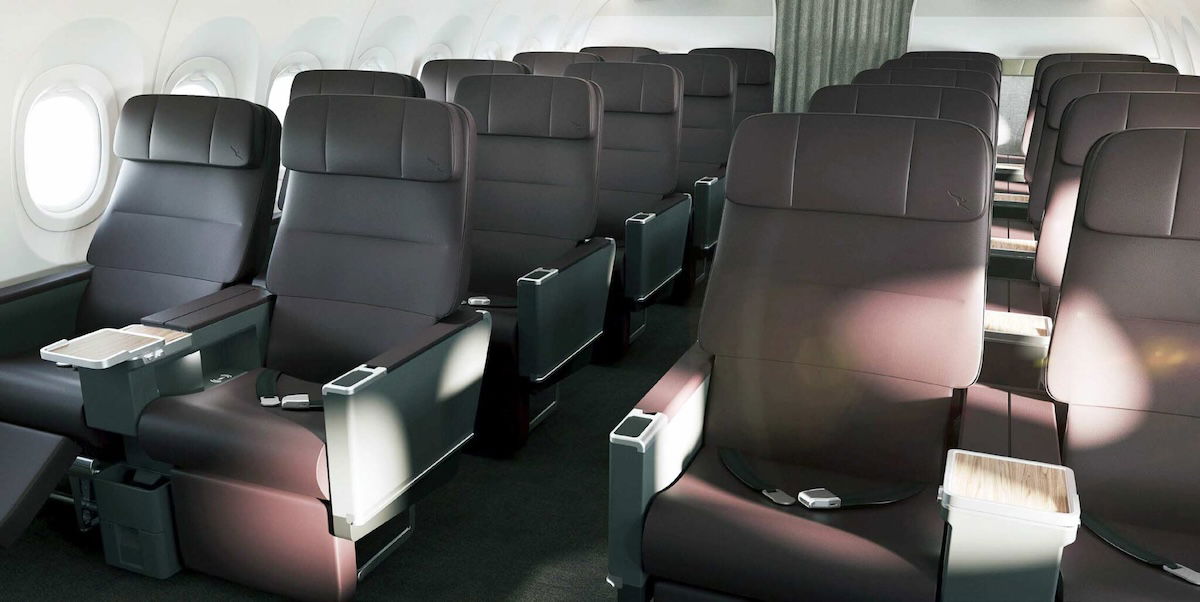
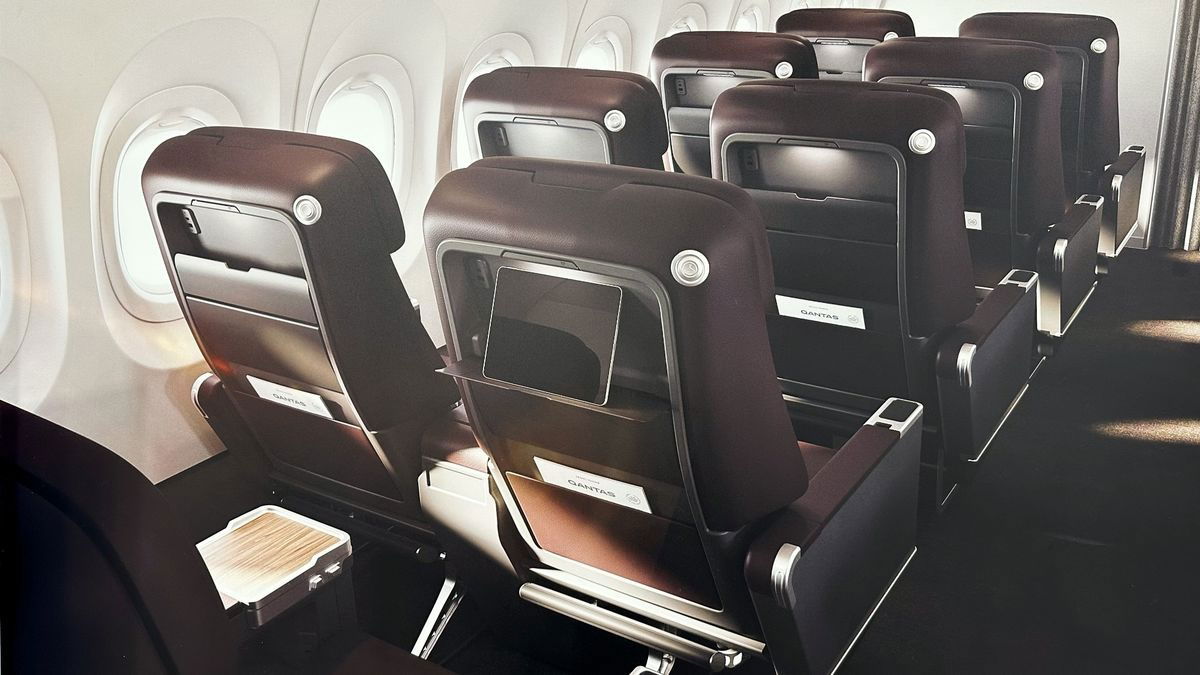
Economy class consists of 30 rows of seats in a 3-3 configuration, once again similar to what you’ll find on Qantas’ other narrow body jets. Seats boast 30″ of pitch, 17.6″ of width, six-way adjustable head rests, personal device holders, and USB-A and USB-C charging.
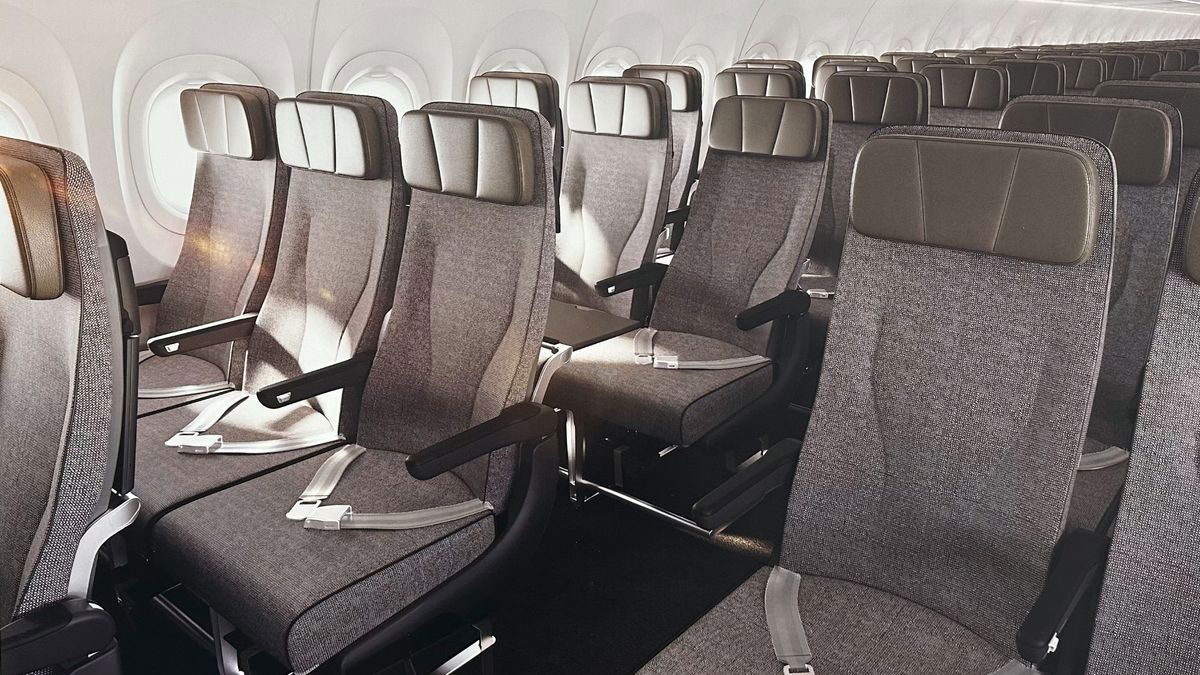
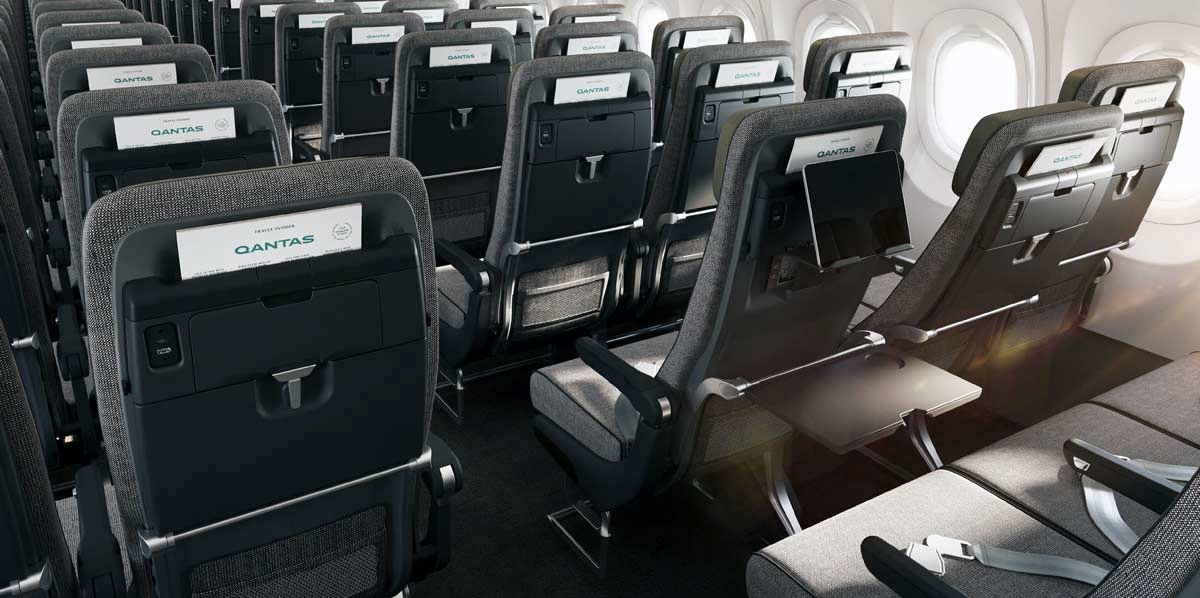
Throughout the plane there’s no seat back entertainment, and instead there’s streaming entertainment. Qantas also plans to offer fast and free Wi-Fi on its A321XLRs, which is something the airline is working toward on a larger scale.
So this configuration is much more similar to American’s A321neo layout than it is to JeBlue’s A321LR layout, for example.
Qantas Airbus A321XLRs replace Boeing 737-800s
Qantas’ primary motive with ordering Airbus A321XLRs is to use them to replace Boeing 737-800s, which are primarily used for domestic and short haul international flights. Admittedly these planes will only partially replace 737s, given that Qantas has 75 of those, while there are only 28 A321XLRs on order.
I’d largely consider that to be good news, in the sense that I think the A320 is more comfortable than the 737. Furthermore, Qantas 737s have 12 business class seats, so the significant increase to 20 business class seats will be good for upgrades and business class pricing.
On the surface, Qantas’ decision to order the A321XLR is a bit confusing. It makes perfect sense that Qantas is ordering from the A321neo family, since it offers the capacity the airline needs. But the airline is going for the extra long range version of the plane, which is capable of operating flights deep into Asia that the 737 couldn’t.
Here’s what adds to the confusion:
- The A321XLR is more expensive to acquire and operate than other versions of the plane, so typically airlines only order these planes if they specifically have the intention of using them for long haul routes
- Qantas states that these planes will primarily be used between major Australian cities (including between Sydney and Melbourne, etc.), and also states that the additional range of the plane “opens up a wider range of direct domestic and short haul international routes (e.g. South East Asia, Pacific islands)”
- It seems like anything beyond the range of the A321neo would really be pushing the type of route on which a full service carrier could justify operating a jet like this
- Qantas is reportedly considering installing flat beds on some of the later A321XLR deliveries, but no final decision has been made; even then, you’d think the airline would’ve split the order between the A321neo and A321XLR
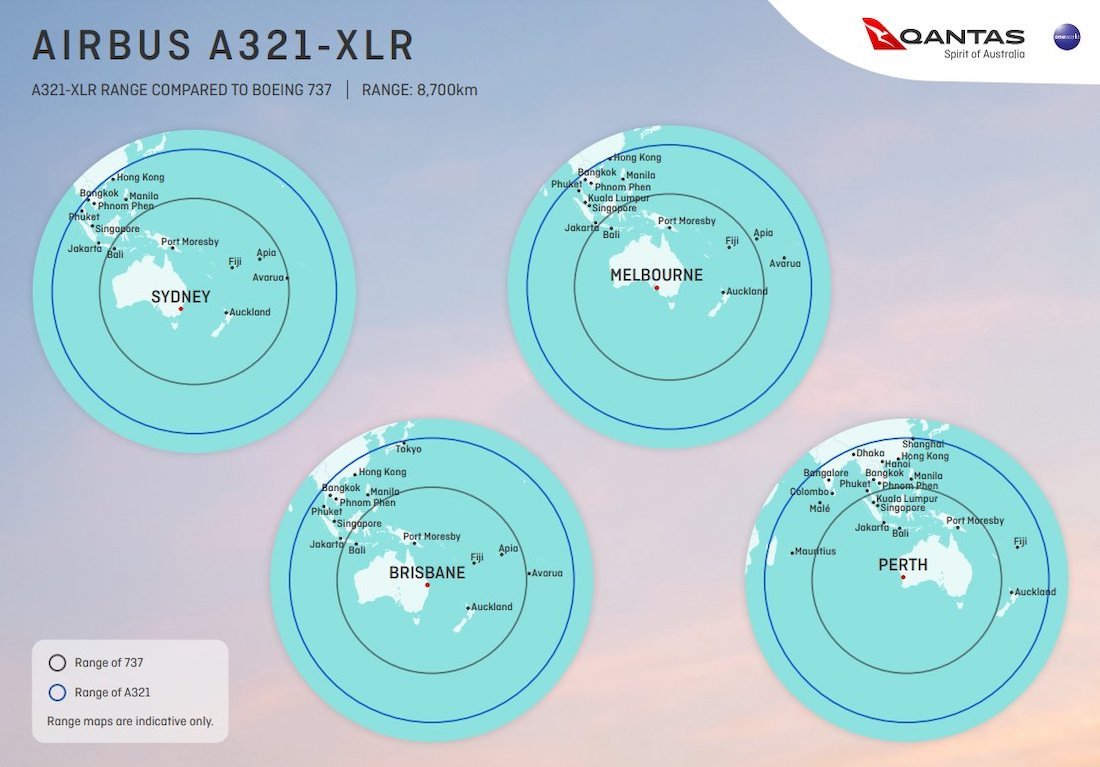
Qantas is generally a conservative airline with its growth, and it’s not just ordering longer range planes for vanity. So what’s the explanation? It’s my understanding that this comes down to cargo capacity. On a transcontinental flight from Sydney to Perth, for example, the A321XLR can carry significantly more cargo than the A321neo, and that’s something that Qantas values.
The A321XLR offers more range thanks to having extra fuel tanks, and also thanks to having a higher maximum takeoff weight. Instead of using that extra maximum takeoff weight for extra fuel, it can also be used for extra cargo weight.
Some might wonder “well why not go for the A321LR then?” That’s the plane that’s between the A321neo and A321XLR in terms of range. This is an area where cargo volume becomes an issue, rather than weight. The A321LR has additional center fuel tanks (where cargo could otherwise go), while the A321XLR has extra rear center tanks. So the A321XLR offers more space for cargo than the A321LR.
Now, I can’t speak to whether that ends up being the right decision or not. As I said, the A321XLR costs more to buy, and also costs more to operate (due to the weight of the extra fuel tanks). It’s hard to know whether the benefit of the incremental cargo capacity on some longer stretches makes up for the increased operating costs on shorter flights.
Bottom line
Qantas plans to add 28 Airbus A321XLRs to its fleet, with the first plane having just been delivered to the airline. While the A321XLR is a jet with incredible range, Qantas intends to use this aircraft primarily for short haul flights, and the plane will be configured accordingly. Qantas will have 197 seats on its A321XLRs, including 20 business class seats and 177 economy seats.
Qantas is the first A321XLR customer that doesn’t seem to be ordering the plane specifically in order to fly long distances, but instead, for the increased cargo capacity.
What do you make of Qantas’ Airbus A321XLR plans?





I just look forward to not being on the crappy old 737s for 3+ hours.
A321XLR, the most overrated plane ever.
This Qantas customization is the worst so far.
Can't wait to see them flying those in long haul routes with premium economy seats being marketed as a business class - with ImmortalSynn and CorcordeBoy justifying that, as if their life depended it of course.
At least it's not a 737, so yay?
No need to "justify" anything. Regardless as to how you (or me, or anyone else) might feel about it, longhaul narrow-bodies have operated since the dawn of the jet age, and will continue to do so for decades. Cry all you want, but that's simply a fact, one that an increasing amount of airlines all over the world, are keen to embrace.
In other words, A321XLR is a plane built with an outdated philosophy from the dawn of the jet age, despite the fact that many widebodies have been developed since to overcome its weaknesses.
Bark all you want, but that's simply a fact, one is just a brainwashing customers lile you an outdated idea into a revolutionary idea that an increasing amount of airlines all over the world, are keen to embrace.
Keep being proud of being brainwashed.
Mason, bro, you really are sounding to be “Proud of being brainwashed”! Brainwashed, into posting like a prehistoric dinosaur.
@AeroB13a
Sounds like you just described your problem. One credit for awareness.
"In other words, A321XLR is a plane built with an outdated philosophy from the dawn of the jet age, despite the fact that many widebodies have been developed since to overcome its weaknesses."
What (in your mind anyway) is that word-salad even supposed to mean?
If there was an inherent "weakness" in narrow-bodies that was somehow "overcome" by wide-bodies, then why are airlines (all over the world) still happily ordering longhaul capable narrow-bodies?
@ImmortalSynn
You really sound stupid.
It's the comfort that no narrowbody can overcome.
Yes, airlines all over the world still happily order the awful plane that is A321XLR.
But have you even looked into WHO are the ones placed the order?
Not a single one is known for providing a high quality service. Not a single one.
They're mostly the low cost carriers and North American carriers - both of...
@ImmortalSynn
You really sound stupid.
It's the comfort that no narrowbody can overcome.
Yes, airlines all over the world still happily order the awful plane that is A321XLR.
But have you even looked into WHO are the ones placed the order?
Not a single one is known for providing a high quality service. Not a single one.
They're mostly the low cost carriers and North American carriers - both of which are keen to cut costs in return for reduced passenger satisfaction.
It's because the smart ones with high standards know that weaknesses, especially comfort of narrowbodies are still inherent and can only be overcome by widebodies.
Play with your word salad carefully next time. Cherry-picking facts don't always work.
Don't ever try to justify those awful planes again, until you see an airline on the same league of ANA, Cathay, JAL and EVA. In other words, never.
"But have you even looked into WHO are the ones placed the order?
Not a single one is known for providing a high quality service. Not a single one. "
Qatar Airways and Etihad aren't known for high quality service?
Hmm..... what were you saying about sounding stupid, again? ;)
Have a look at Analytic Flying's piece on Why Qantas ordered the A321 XLR without lie-flat business class seats.
https://www.analyticflying.com/p/why-qantas-ordered-the-a321-xlr-without
Analytic Flying's hypothesis is : "Qantas have purchased the A321neo XLR due to its cargo carrying capability."
Qantas got a great deal from Airbus as they were ordering the A350-1000ULR. It has nothing to do with cargo. It's all about the price and versatility of the A321XLR. If need be they can deploy the plane on longer thin routes especially to India.
Qantas' subsidiary Jetstar already flies the A321neo and A321LR.
QF announced a cabin upgrade to 42 of the 738s starting in 2027. So, I'd predict they expect the newer 738s (the ones being upgraded, I presume) to fly for a while. QF has a load (90 or so?) of options across the 220/320 family. At some point, I'd expect the options will be turned into 320neos and 321neos orders to, over the long term, turn QF into an Airbus-only narrow body airline with a mix of 221, 223, 320neo, 321neo, and 321XLR.
QF is using the XLR primarily as a domestic configured high capacity alternative to every other narrowbody.
The XLR gives it the range to do 8-9 hour flights which no other narrowbody can do with that many passengers.
They don't care about the premium cabins that other airlines are putting on longer range 321NEO versions.
But to Ben’s point, QF does not operate 8 hour domestic flights so the choice between NEO. vs LR vs XLR does not make sense beyond freight uplift.
the question is whether they would ever choose to operate a domestic configured aircraft to SE Asia. If so, this aircraft could do it.
If they buy a 321LR, that option might be permanently closed.
the question is whether they would ever choose to operate a domestic configured aircraft to SE Asia. If so, this aircraft could do it.
If they buy a 321LR, that option might be permanently closed.
AKL/CHC to PER flights could be a good fit for this. Not domestic but within scope.
Amazing that QF manage to mis-spell Phnom Penh's name four times in the same image...
There've been a couple of pieces on this in the papers down here, including in the SMH.
If Qantas could stop sucking as an airline Aussies might actually root for them.
Scan the comments on Australia's ET website, which is nothing but a paid shill for QF, and you'll see the majority are against the hardware choices (not the aircraft itself) such as no IFE screen, recliners in business class etc. etc. That really says something since the censorship of negative QF comments and sleight-of-hand tactics (e.g. burying an unavoidable QF bad news article under a flood of other articles) at ET are well known. QF...
Scan the comments on Australia's ET website, which is nothing but a paid shill for QF, and you'll see the majority are against the hardware choices (not the aircraft itself) such as no IFE screen, recliners in business class etc. etc. That really says something since the censorship of negative QF comments and sleight-of-hand tactics (e.g. burying an unavoidable QF bad news article under a flood of other articles) at ET are well known. QF has sucked since Joyce took the helm. And there is no hope of recovery. And it sucks under the new head, whose name I don't care to remember. Keep flying Australia's 'unofficial' carrier when you can - SQ. I know I do.
Clearly this will mainly do what the a330, and before that the 767, used to do which is PER-SYD/MEL/BNE with golden triangle morning flights and the occasional foray to the nearer parts of Asia.
Qantas is pretty conservative so in might be as simple as make BNE-NRT daily on a321, which makes MEL-NRT daily. Maybe they try BNE-KIX or FUK if BNE subsidises. Maybe it’s PER-SIN, a return to ADL-SIN, making MEL-CGK daily or...
Clearly this will mainly do what the a330, and before that the 767, used to do which is PER-SYD/MEL/BNE with golden triangle morning flights and the occasional foray to the nearer parts of Asia.
Qantas is pretty conservative so in might be as simple as make BNE-NRT daily on a321, which makes MEL-NRT daily. Maybe they try BNE-KIX or FUK if BNE subsidises. Maybe it’s PER-SIN, a return to ADL-SIN, making MEL-CGK daily or PER to New Zealand.
Basically I’m pretty skeptical that Qantas try much of anything new with this. It’s just going strengthening some routes where wide bodies used to go daily.
Even anything new between QLD and Japan is probably more likely to be under the Jetstar brand. QLD is basically a second Hawaii for Japanese suffering from a strong US dollar.
They're not going to do Japan in a narrow body with recliner seats in premium. Why would anyone choose this.
They made Perth suffer recliner seats to Singapore for years and downgraded cross country redeyes to 737s. DPS-MEL is a long tortuous redeye in a 737 as well.
Qantas knows what a captive crowd it has and will make them suffer.
Biz from BNE-NRT does not pull in the dollars like SYD-HND or MEL-NRT. I should know I often fly it because the prices are often substantially less starting in Melbourne and going...
They made Perth suffer recliner seats to Singapore for years and downgraded cross country redeyes to 737s. DPS-MEL is a long tortuous redeye in a 737 as well.
Qantas knows what a captive crowd it has and will make them suffer.
Biz from BNE-NRT does not pull in the dollars like SYD-HND or MEL-NRT. I should know I often fly it because the prices are often substantially less starting in Melbourne and going via Brisbane.
If you’d ever eaten the Japanese option on the BNE-NRT QF flight you’d know how little Qantas cares about business passengers flying that route.
What are people going to do? Some will backtrack via Sydney to get jal, ANA or a much more expensive Qantas flight. The people who are willing to detour via Hong Kong probably already are. Maybe China airlines picks up a bit more.
Qantas has Australia by the balls and it knows it.
I'd love to see Qantas expand their Pacific Island route network with this plane to take on AirNZ
Is this decision driven by cargo capacity? Both the weight but also the ULD configuration in the hold. I seem to recall that there's a slightly counterintuitive optimum solution if you want to choose the A321 that balances both passenger and cargo revenue.
Just seen that you've highlighted that!
Nothing to do with delivery delays, quality assurance issues or general safety concerns then David?
Australia has a poor freight rail network.
So yes, cargo does very much matter down under.
Yes David.
Most XLR customer don't really need the range of XLR.
The base A321 takes 10 LD-3
The A321LR takes 7 (space of 3 is converted to ACT)
The A321XLR takes 8 (7 if you add 1 ACT to reach 8,700km advertised range)
So if you need the range of LR but with a little extra cargo space, upgrading to the XLR is brilliant.
Pretty sure Airbus doesn't even market the "A321LR" anymore, as any base A321NEO w/v is now capable of 97 tonnes, and up to 3 ACT, with comms package upfront.
So it's really just an issue of do you want -XLR or not, and if not, how many ACTs you going to duct your A321NEO for.
As an expat South Australian in the UK, I have to wonder whether the range here means additional routes out of ADL could be on the cards given the lower minimum scale to make a route work here vs wide bodies. UA have announced the SFO direct, and QF have said ADL-AKL is relaunching Novembet, so maybe it is time to resurrect ADL-SIN?
A good choice Qantas, rather safe than sorry!